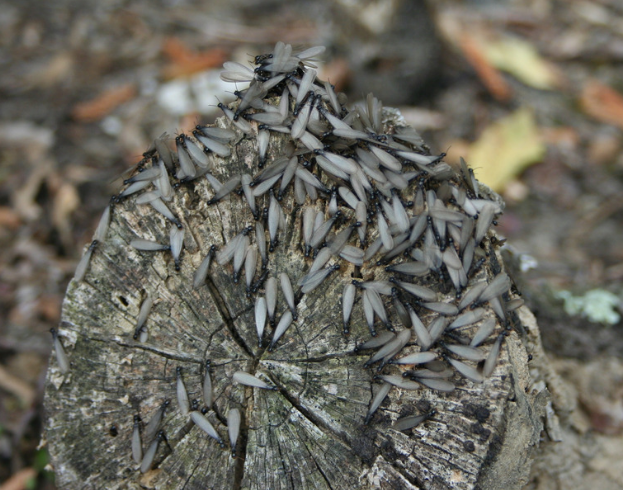Yes. As surprising as it may sound Orange oil can kill termites very effectively. It is considered a ‘Green Insecticide’ due to its efficiency and environmentally friendly qualities.
Orange oil is ideal for new termite infestations in their initial stage.
But can orange oil be used to remove large scale termite infestations from entire homes?
The answer to this question has varying degrees of opinions. Although orange oil is extremely toxic to termites, complete eradication of an infestation depends upon how it has been applied to the infested area. Using orange oil efficiently is very important for a successfully complete purge of termites.
No matter wherever in the world a person is living if they face a termite invasion then it spells trouble for them.
A termite infestation other than being seriously irritating can cost thousands of dollars if left untreated. When thinking of termite treatment insecticides come to our mind but the toxic sprays can harm both your health and the environment.
Termites are extremely tiny little pest with a body size of only 4 to 15 millimeters, which makes it very easy for them to crawl into wooden openings.
Termites have only one mission for their existence; eat as much of wood as they can.
Every year termites cause considerable damage to various properties all over the world. They have the ability to eat through everything made out of wood, whether it is entire houses, floors, walls, kitchen cabinets, wall supports, furniture, decks etc.

Termites eat wood from the inside out that’s why it is so difficult to spot them. Sometimes the only way to spot a termite infestation is the presence of a termite trail which is a byproduct of their highly organized colony.
From an economic point of view every year termites eat their way through wooden property worth more than $7 billion.
Termites have an uncanny ability to increase their brood to thousands, within just a few weeks. After the onslaught of termites any piece of wooden structure will most definitely require treatment or the spread will never stop. If an infestation is spreading rapidly it is highly advised to call for the services of an experienced professional.
How to use Orange Oil to Treat Termite Infestation
Using orange oil as a termite treatment involves drilling holes in walls or floors of our homes. Similarly it can also be injected into infested areas.
The hollowed channels or galleries termites have formed in wooden panels by eating from the inside. Orange oil can be easily absorbed by the wood without fear of any dampness of leakage.
Even when sprayed and fumigates, D-limonene gets easily absorbed by wooden surfaces and furniture. So when termites go to feed on the treated wood, they ingest the D-limonene and die.
Before termite treatment we need to examine the extent of the damage caused. Three things are very crucial for choosing the right kind of treatment method:
- Identify the type of termite causing damage
- The level or size of the infestation
- Measures needed to prevent spreading
There is an ongoing debate on which method is best for treating termites using orange oil. Some experts believe spraying orange oil directly on termites is the best way to ensure their eradication.
Direct contact with the oil will directly expose the termites to toxicity. However findings and spraying direction onto a termite population is not an easy task.
The second preferred method is to drill holes and inject the orange oil solution directly into walls and floors. The method would flood entire colonies of termites and guarantee their death. However the method has one big disadvantage.
The person injecting the solution may fail to recognize an infested area or a little portion may be left untreated.
The termite infestation can rear back its head via even this small area and multiply back to its original numbers.
When administered properly the fumigation of orange oil is considered the best treatment option. Fumigation involves orange oil and heat which are both deadly to termites.
Other methods of treatment are more target area specific; meaning the area to be treated has to be found first.
Fumigation of orange oil can be carried out on the entire house without any adverse effects. The orange oil fumes can penetrate deep into the walls, floors, furniture and even clothing.
In this way the entire house can be treated at once and the treatment reaches all the infestation in different areas of the house. There’s only one drawback to using the fumes of orange oil.
After fumigation the house needs to be sealed for a few days. The orange oil fumes, although non-poisonous, can cause mild irritation of the eyes and skin.
Orange Oil products
Different products contain different concentrations of orange oil. Some light products use as 10 percent while others are made up of 95 percent orange oil.one of the most popular and effective products contain orange oil for termite treatment is called XT-2000.
The product is concocted from steam-distilled orange peel. XT-2000 contains 95 percent pure D-limonene and therefore saturates well into wooden areas and effectively destroys termite infestations. The treatment doesn’t just eradicate a pest infestation but also leave behind a lingering scent of oranges.
How to make an orange oil termiticide at home?
A small infestation can be nipped in the bud before it seriously spreads. Anyone can make their own orange oil termite pesticide at home. Just a few simple ingredients and materials are required such as:
- Biodegradable liquid soap
- Essential Orange oil
- Water
- Spray bottles
In the spray bottle add 1 ½ tablespoons of the liquid soap and about 1 quart of water and mix it together. Then add 15 to 20 drops of orange oil.
Shake the mixture and spray it wherever termites might be nesting.

Since orange oil is a natural essential oil it comes with a whole host of benefits which cannot be availed if a chemical alternative is being used.
Here are some pros
- Orange oil is a toxic insecticide but otherwise harmless to human health. During treatment time even pets and house plants don’t have to evacuate. Even food is safe to eat even after it has been exposed to orange oil.
- If a house is being treated with orange oil then there is no need for the homeowners to leave it. They can carry out the treatment while staying in their house. Likewise pets and plants do not have to be removed.
- Orange oil does not leave behind any toxic fumes or smells and does not pollute the air inside a house. On the plus side it leaves behind a nice orange scent after the treatment.
- Orange oil is easily available in the market at all local stores and is considerably cheap than other chemical grade insecticides.
- Orange oil treatment is quick and for small scale infestations you can apply it yourself. For instance If the infestation has just started then a spray of orange oil is more than enough to curb it. But if the infestation spreads then professional pest control is the best option.
Here are some cons
- Even though orange oil is known for its effectiveness in killing dry-wood termites, there isn’t enough evidence to suggest it does the same with subterranean termites. Basically it can eradicate small termites infesting a single area, like a room or basement, but may not be very good at treating large scale infestations, say an entire building.
- Orange oil is limited by its short residual effect. Meaning the treatment is effective for a short span. When applied orange oil will make sure to kill all the termites but only for a few days.
- After a week the oil will dissipate and offer no long-term protection against returning termites. This is why some experts recommend combining orange oil with other lasting insecticides for long-residual effects. Only two termites left behind can restart an entire colony and reproduce until there is an entire swamp of them.
- Over-long exposure to orange oil may cause allergic reactions in people with sensitive skin and breathing problems. So people with eczema or asthma need to be extra careful before considering a orange oil termite treatment.
